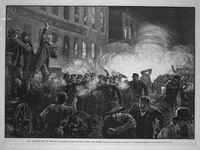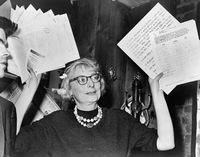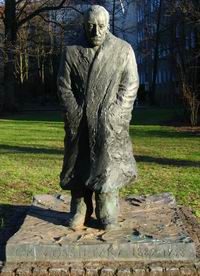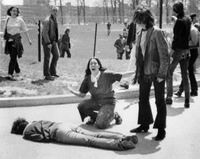|
|
Seeds of Fire: A People’s Chronology
Recalling events that happened on this day in history.
Memories of struggle, resistance and persistence.
Compiled by Ulli Diemer
|
May 4, 1886
|

|
|
The Haymarket Affair. An unknown person throws a bomb at police at a rally in Chicago’s Haymarket Square. The rally has been called to support workers striking for the eight-hour day. The bomb blast and ensuing gunfire result in the deaths of an unknown number of civilians and eight police officers, most of them shot by other police firing indiscriminately into the crowd. In the trials that follow, eight anarchists are tried for murder. Four men are convicted and executed, and one commits suicide in prison, although even the prosecution concedes that there is no evidence that any of the defendants had thrown the bomb.
|
|
May 4, 1886
|
|
|
The Bay View Massacre. Several thousand workers and their families are camped in a field near the Milwaukee Iron Company. Some of the workers are on strike against the company, others have come to rally in favour of the eight-hour day. On the morning of May 4, a crowd moves in the direction of the company#s property. National Guard militia, ordered by Wisconsin Governor Jeremiah Rusk to “shoot to kill” anyone who approaches the steel mill, fire directly into the crowd. Seven people are killed, including one child; many more are injured.
A subsequent investigation praises the National Guard for their restraint and their humane behaviour in firing only one volley into the crowd. None of the killers are charged, but 50 strikers are sentenced to prison terms for ‘rioting’ and ‘conspiracy’.
|
|
May 4, 1916
|

|
|
Birth of Jane Jacobs (1916-2006), author of groundbreaking books on urban studies and economics.
|
|
May 4, 1931
|
|
|
The Harlan County miner’s strike of 1931-32, also known as the Harlan County War, pits 18,000 coal miners against police and gun thugs hired by the companies. On May 4, a confrontation results in the death of three company gunmen and one miner.
It is in the midst of this strike that Florence Reece, married to one miner and the daughter of another, reacts to an attempt by Sheriff J.H. Blair and his thugs to intimidate her by writing the song “Which Side Are You On?” which becomes an anthem of the labour movement.
|
|
May 4, 1938
|

|
|
Death of Carl von Ossietzky (1889-1938), German pacifist imprisoned by the Nazis. He is awarded the Nobel Peace Prize in 1936 but cannot go to receive it because he is in custody. Denied medical treatment for tuberculosis and for the injuries inflicted on him in the concentration camps, he dies in 1938, still a prisoner.
|
|
May 4, 1961
|
|
|
The first Freedom Riders leave Washington D.C., bound for New Orleans. The Freedom Riders are black and white activists determined to challenge the government’s failure to enforce the legal decisions which had ruled segregation illegal on interstate buses.
The Freedom Riders set out on buses with blacks and whites sitting together, challenging the ongoing practice of segregation. They are attacked by Ku Klux Klan members and police (often the police are in fact members of the Klan) and repeatedly beaten en route. At one location, a mob attempts to burn the bus they are on with the Riders trapped on board.
As some Riders are hospitalized or imprisoned, others set out on the same journey. At one point, 300 are imprisoned in the Mississippi State Penitentiary, where they are denied mattresses, sheets, and toothbrushes.
Faced with international condemnation, the Kennedy administration first criticizes the Freedom Riders for being unpatriotic because they are embarrassing the United States in the eyes of the world, but then moves slowly and reluctantly to enforce the law. Finally in November, the Interstate Commerce Commission issues rules requiring bus companies to abide by the law, doing away with “white” and “colored” waiting rooms, washrooms, and eating facilities in bus terminals and train stations.
|
|
May 4, 1970
|

|
|
The Kent State killings: Troops of the Ohio National Guard fire into a group of students protesting the U.S. invasion of Cambodia. Four students are killed; nine others are wounded, several seriously.
Subsequent investigations show that there was no justification for the shooting: the soldiers were not being threatened or in any danger. Evidence shows that a number of Guards had in fact conspired to “get those bastards”, i.e. student protestors they saw as disloyal to the U.S.
Despite the clear evidence that the shootings were pre-meditated murder, the government declines to lay charges.
|
|
For more information about people and events in Seeds of Fire, explore these pages:
|
|
|
|
|
|

